American Gerontocracy
Is being ruled by the elderly a bad thing?
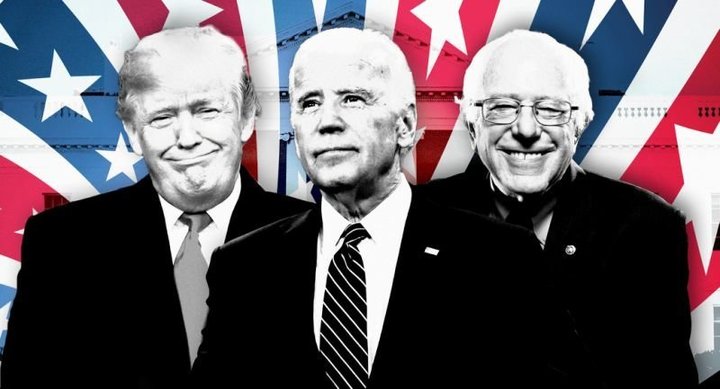
Barring tragedy, the oldest US President ever inaugurated will take the oath of office at noon 20 January. The youngest possibility is a re-elected President Trump, who turns 74 in July. The oldest is Bernie Sanders, who will be 79 in September.
The Atlantic’s Derek Thompson wonders “Why Do Such Elderly People Run America?“
The most obvious reason America’s presidential candidates are so old might be that Americans are getting older. Voters over 65 routinely go to the polls more often than young voters do, and political-science research has found that voters typically prefer candidates “who are closest to themselves in age.” This sounds like a universal formula: Older countries produce older politicians.
But since the 1980s, almost every European country has gotten older, while the typical European Union leader has actually gotten younger. In the United Kingdom, although people over 55 outvote people under 30 by one of the widest margins in the world, the current prime minister, Boris Johnson, is “only” 55. Biden, Sanders, and Trump are all older right now than the U.K.’s five previous prime ministers, going back to Tony Blair.
But, of course, that’s not a useful comparison. Europeans don’t select their leaders in the way Americans do. In almost all cases, the party elites chose the candidates they will offer to the public. Here, the most enthusiastic partisans in the public choose the party’s candidates.
Maybe it’s about decades of youth disengagement from politics. According to The Economist, older Americans have outvoted younger Americans by a wider margin than in the typical OECD country. This is particularly true at the local level. As Timothy Noah writes in Politico, studies have found that the median voter age in America’s municipal elections is 57—“nearly a generation older than the median age of eligible voters.”
Again, there are a series of systemic differences that my co-blogger Steven Taylor can explain better than I can. But we make it harder to vote here, which favors retirees and those who have flexible, salaried jobs. And our elections tend to matter less, given that there are only two meaningful parties and a system that virtually ensures gridlock regardless of who gets elected.
But maybe this is the key:
To be clear, this phenomenon is bigger than politics. Across business, science, and finance, power is concentrated among the elderly. In the past 40 years, the average age of Nobel Prize laureates has increased in almost every discipline, including physics, chemistry, medicine, and literature. Among S&P 500 companies, the average age of incoming CEOs has increased by 14 years in the past 14 years. Americans 55 and older account for less than one-third of the population, but they own two-thirds of the nation’s wealth—the highest level of wealth concentration on record.
The prevalence of old power is undoubtedly related to the prevalence of old age. Higher-income Americans are living longer than ever and working longer, too. Leading the country is tiring work (at least in theory) but it’s not taxing in the way that factory work or construction is. As the economy shifts to white-collar labor, septuagenarians are staying at work. The share of Americans over 75 who are attached to the labor force has increased by 85 percent in the past 20 years.
Regardless, Thompson thinks this is a bad trend, at least insofar as our politics is concerned.
First, gerontocracy is a cousin to plutocracy. Power concentrated in the hands of old people who are also rich will predictably lead to policies that benefit the old and the rich, at the expense of the less privileged. The federal government already guarantees universal health insurance and a universal basic income to seniors, even as Republicans cry socialism when young people request versions of the same policies. It’s unlikely that young people will notch many policy wins in a government whose median age is over 70.
Second, old governance can be bad governance. At the end of the Cold War, a common criticism of the U.S.S.R. was that the country was crumbling in part because the Soviet politburo was too old and out of touch to keep up with a changing world. Research indicates that cognitive deterioration typically accelerates in one’s 70s. Without encouraging voters or employers to be ageist, it seems risky to leave the most important issues of life, death, and welfare in the hands of a group of septuagenarians who are in the crosshairs of biologically predictable cognitive decline.
Finally, the most important challenge before the U.S. and the world—climate change—is profoundly intergenerational. Solving it requires a farsighted approach to diplomacy, invention, and technological deployment that a creaky old country will simply never master. This crisis urgently requires the input and ideas of the generations that will be most affected by it. If government of the elderly, by the elderly, and for the elderly will not perish from the Earth, the rest of us might suffer instead.
Now, I find the last argument unpersuasive. The Democratic Party is led by people at least as old as the Republican Party and they’ve been pushing for a response to climate change since we called it “global warming.” Our problem is a lack of consensus, not gerontocracy. And old leaders can and do still turn to young experts.
But I do indeed worry about cognitive decline and plutocracy.
Thompson’s colleague Graeme Wood looks on the bright side in “The Upside to Having an Old President.” But he may be kidding.
The two elderly front-runners for the Democratic nomination share an improbable trait: Despite their advancing years, both men seem to have an energy level that I could not achieve if I spent all morning chugging coffee and gobbling amphetamines. That level of energy is, as generations of political observers have reminded us, what it takes to win the presidency. Whether it is a sustainable and permanent condition is another matter. Actuarial tables say that we can expect about nine more years out of Joe Biden and eight more years out of Bernie Sanders before they slow down significantly, due to their death. Of course, few people die at the height of their powers, whereas everyone experiences a gentle cognitive decline, and then a steep one if and when dementia sets in.
What happens when a president goes senile while in office? For good reason, we worry about this possibility—and whether the Twenty-Fifth Amendment, which governs the president’s incapacitation, is one of the parts of the legal system that still functions, or one of the parts that the Donald Trump era has exposed as a nullity. But it’s just possible that the creaky machinery of an aging brain might make a president better at the job.True enough, an old president will not function with the acuity of a young one. Give him a set of arithmetic problems, and watch him fumble, while his neuronally gifted interns ace the test or, more likely, cheat with their smartphones. The decline in the ability to deal with most simple cognitive tasks is linear from young adulthood to very old age, says Gregory Samanez-Larkin, a neuroscientist at Duke University. Your mind declines no faster from 55 to 65 than it does from 35 to 45. (After 70, the decline becomes less predictable, mostly because those ages have been studied less.) If you have ever sat impatiently while watching an older relative try to find a television channel or use a remote control, that decline is what you witnessed.
Of course, if decline is linear starting at 35, a 55-year-old will have experienced a mere two decades of degradation compared to four for the 75-year old. That’s not a good argument for electing 75-year-olds! And, indeed, it might be an argument for nominating Pete Buttigieg right now before he gets dumber.
But, it turns out, getting older isn’t all bad:
But consider what that older relative witnessed: your impatience, and perhaps even your inability to tame your desire to flip channels like a madman. Samanez-Larkin and his colleagues Daisy Burr, Jaime Castrellon, and David Zald recently found evidence that older adults are better at keeping their emotions and impulses in check. Their results, published in Emotion, “provide unique evidence that emotional health and regulation improve with age.” Moreover, Samanez-Larkin says, the set of skills known as “decision making” does not decline in any predictable way during normal aging. The interns might be whizzes at a chalkboard, but faced with complex decisions—whether to buy a new TV, say, rather than how to use it adroitly once they have it—the fogies match and sometimes outperform them.
The question then becomes: Is being president more like having to do a lot of math problems, or more like having to contain one’s emotions and make difficult decisions? It might be both: Presidents need to have a spry brain, capable of assimilating new information and rapidly adding it to their cognitive repertoire. But the job is, most crucially, about making decisions—extremely difficult decisions that are, unlike arithmetic, matters of judgment and value. The rightness of a decision is often unknowable ex ante. In these treacherous exercises, the elderly do not do badly, and impetuous youngsters sometimes come very close to getting us all killed. When you travel to a country with lots of road deaths, you should choose an old taxi driver with a very slow car.
Of course, our current septuagenarian President is hardly the poster child for impulse control. I’d hate to have seen what he was like at 45 if this is his mature self.
There is also the question of energy, which—unless Sanders (78) and Biden (77) really are on amphetamines—seems certain to decline, and probably within the four- or eight-year period during which they might hold office. (Compared with them, Trump is a spring chicken—a Rhode Island Red, judging by color—of 73.) The job of a president has, historically, been exhausting emotionally and physically, and we should prepare for the possibility of a president who, like Ronald Reagan in his later years in office, simply slows down.
This, too, might have some upsides. The more presidents slow down, the more decisions get made by other people. Call it the “Weekend at Bernie’s presidency,” though either Democratic candidate, or Trump, could graduate to this geriatric mode of administration. And perhaps we’d all be better served if other people—and not Biden, Sanders, or Trump—were making decisions. I see ample reason to question the soundness of the judgment of all three men.
I’m not sure the Sanders camp will appreciate the “Weekend at Bernie’s” nomenclature. And, while diffusing decision-making is generally a good thing, the whole point of democracy is that the people choose who makes the ultimate decision. And, frankly, Trump hasn’t exactly inspired confidence in his staffing choices.
Remember the joke about the diners who complain about a restaurant’s bad food, but also its small portions? A president who delegates lazily would be an ineffectual president, but one whose mistakes were blunted along with his successes. One diagnosis of the dysfunctions of the early Trump era is that the president did not know how to make things happen, so he flailed—occasionally making wild policy moves by tweet, without the interagency cooperation and feedback that allow desire to become fact. That feral incompetence has become less common as Trump has become familiar with his job, and I doubt anyone would prefer him to be feral and effective.
Wood isn’t known as a satirist so I’m assuming he’s being serious here. While I agree that the Trump presidency could have been even worse had he been more skilled, it’s hardly evidence that we should welcome a geezer in the White House.
If the president took a Valium instead of a morning espresso, one possible outcome for the Weekend at Bernie’s presidency would be an administration that is simply muted in its effects, with no delegated official eager to initiate major change from the status quo. It would be, in that sense, a more conservative presidency. No doubt progressives would feel cheated by a President Sanders who hits snooze rather than wakes up early to fight for systemic economic change. But systemic change comes slowly, and sudden policy decisions tend to be bad ones. A leader who is economical in his actions and laconic in his tweets does not sound all that unwelcome right now. Executive power wielded through sweeping policy changes and fiat is simply a bad way to use the presidency; the slow and laborious process of cooperative change is more effective, whether your goal is immigration reform or socialized medicine. (Granted, the risk of delegation is considerable too. Policy conducted in the president’s absence might just result in off-the-books shenanigans like the Iran-Contra affair.)
So, this argument might be compelling in a parliamentary system. But our system is already designed slow progress through separation of powers and checks and balances. A competent Democratic President is likely to be stymied by a Republican-majority Senate as it is. We really don’t need to add feebleness of mind to the mix.
Samanez-Larkin says he welcomes the prospect of a really old president. Stigma against the elderly is worth fighting, he says, and cognitive decline could be balanced out by the wisdom of age. But he does have one warning. “The scariest thing is change,” he says. “If you see someone who is elderly changing suddenly, that is a very bad sign,” because dementia or another neurological disease could be taking over.
For now, though, enormous changes do not appear to be afflicting the candidates’ brains. Biden still loves Amtrak and himself. Sanders hasn’t changed his mind about anything, including the U.S.S.R., in 50 years. These foolish consistencies may be, as Ralph Waldo Emerson said, “the hobgoblins of little minds.” At least they are not signs of senile ones.
There is that, I guess.

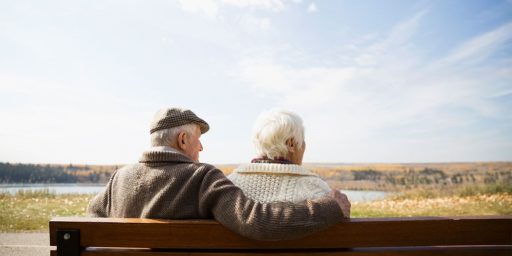
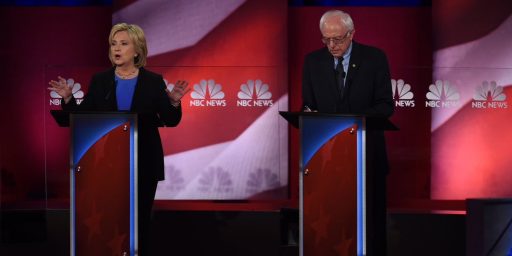
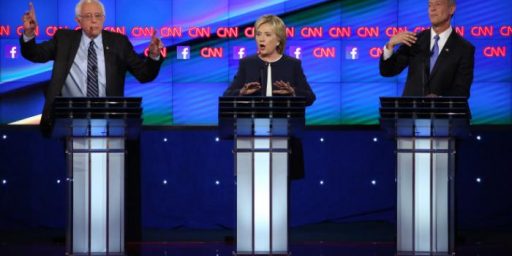
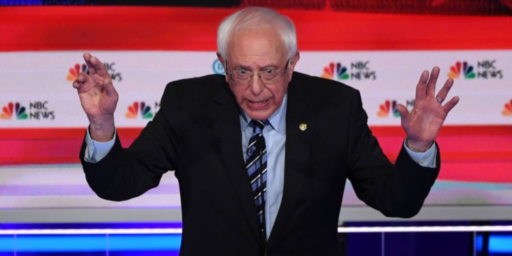
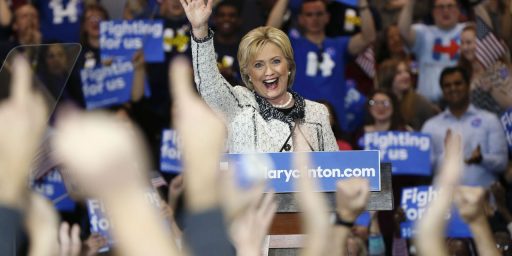
The Boomers are loath to give up their positions of authority because it would require accepting their imminent mortality. Gen-Xers are too small a cohort to take power from them, so the generational sea change that would normally have occurred over the last 10 years has been delayed until the Millenials reach the age where they can take it whether Boomers are okay with it or not.
Dyam, Betteridge was wrong. The answer to your subhead question is “yes”. (And I’m too old to be accused of ageism.)
In one of your quotes Graeme Wood questions whether the 25th amendment can work under Trump. No, it can’t, unless it’s an open and shut case, blindingly obvious to the public, leaving the cabinet no choice. To strike at the king requires guts, we have Pence. The more relevant question is whether our bothsides infected press would report on cognitive decline in Trump. Let me change “would report” to “will report”. Trump’s decline doesn’t seem hypothetical. It should be easy. They don’t have to make a judgement or take a side, they just have to quote him extensively.
@Stormy Dragon:
While Trump—like Clinton, Bush, and Obama—is a Boomer, Biden and Sanders are Silents–the generation before the Boomers. We may actually be moving backward.
@Stormy Dragon: I wish folks would get their demographic categories right. Neither Bernie or Biden, the two oldest, are, in fact, Boomers. Mike Bloomberg isn’t a Boomer, he was born in 1942. William Weld (who is also running for president) was born during WW2, so he isn’t a Boomer.
Many of y’all just use “Boomer” to mean old, but it don’t mean that.
The second point is that people respond to their situation, pretty strongly. This generation of people in their 70’s is probably more healthier than they’ve ever been. They are feeling stronger and more alert than anyone that age ever has, because of health alerts. They are doing a lot better than my Grandma did when she was 70, and at that age, she was visiting the old folks home to help with the old people.
The list of “people who want to hang on to power” includes pretty much everyone everywhere of every age and generation. Meanwhile young people support one of the oldest candidates in it by a large margin, and last cycle, spurned a younger candidate to do it. Also, there are now more Millennials than there are Boomers.
There is something odd demographically going on, with regard to the CEO age increase. I also find the huge gap in age between the top candidates, and the most interesting new guy (Pete!). Maybe this is more about Gen X and its famous disengagement, as well as its low numbers?
@James Joyner:
@Jay L Gischer:
This is a much larger issue than the presidency. Society wide, Boomers are hanging on in leadership positions long after they should have retired, blocking the ability of all the subsequent generations to move up in the world. Pointing out that Biden is a few years too old to be a Boomer doesn’t change that, although nice job trying to derail the conversation by using irrelevant trivia as a distraction.
Trump’s cognition has little room for decline before it hits bottom.
@Stormy Dragon:
My point was an amplification, not a distraction from, yours: Biden and Sanders actually represent a step backward in terms of age.
But I do think the Silent/Boomer thing matters somewhat. The oldest Boomers are just turning 74 and, yes, they should be retiring and clearing the way for younger generations, not only in the C-Suite but all the way down the line. But the youngest Boomers are just a year older than me, 55, and won’t even be eligible to retire at full Social Security for another eleven or twelve years.
@Kathy:
Let’s hope we don’t have to watch that while he’s still in office.
@Stormy Dragon:
Not challenging you, merely curious: is that just your impression or is there data behind that?
I think this is the heart of the matter. Add to the fact that today’s seniors (including me, I collect my first SS check next month) are being supported, by and large, by borrowed money, that will impact their children and grandchildren. All the calls to deal with the deficit (by many seniors, as well as the well-to-do) will not take one dime from us. All proposals for for the future will fall on the young and middle aged. Can anybody blame the youth of today (including my adult children) to reject those proposals and support just the opposite?
I’m 65 and not remotely unwilling to surrender power to a younger generation. I’ll vote for Biden because one by one, every capable woman has been abandoned by women voters, and the yutes rallied to Grandpa Simpson. Old white men did not narrow the field to these two, Boomers did not shape this race. This is African-Americans, ideological college kids and women who won’t vote for women.
I’ve found that a whole lot of people start running out of fucks to give the older they get, which does not lead to better impulse control.
The passions wane in tandem, but there’s far more “well, if you want Coronavirus, just keep licking that doorknob…”
@Stormy Dragon:
Neither Bernie Sanders nor Joe Biden is a Baby Boomer. They are both Silent Generation. The only Baby Boomer among the top Congressional leaders is Chuck Schumer—the rest are Silent Generation.
The Silent Generation has held material control over the U. S. government for some time and before that it was the “Greatest Generation”.
James:
There are positives and negatives in the increasing age of top leaders. All other things equal, I would personally prefer that our political leadership be between 50 and 63 in age or, in other words, I think that our present political leadership is too old but a lot of Congressional leaders would need to release the reins of power to make my preferred outcome a reality.
Let me mention two issues unmentioned so far: risk and technology. Technology first. The reality is that very, very few members of the Silent Generation have a visceral understanding of the technology that is so much a factor in daily life today. I don’t see how you can come to a genuine understanding of modern life without that.
Now risk. Life expectancy and, even more seriously, the likelihood of debilitating health events, are increasing more slowly than the age of the leadership. That presents risks of instability that I do not believe we should be taking. It’s not just dying in office that’s the risk, there are strokes, debilitating cardiac events, susceptibility to disease due to a weakened immune system, and so on.
Whom so ever wins in November, there is almost no chance they will stand for reelection in 2024. Tiny for obvious reasons and B-boys for their age. I’d also opine, that whoever is elected in Nov, won’t complete their term.
Gerontocracy is self correcting.
Choose the VP well boys.
Given the observed mental decline of Trump and the mental decline that can often occur in people as they get older, I’d rather either put a hard-and-fast cut-off of 60 years of age or insist that anyone running for political office get tested for mental illnesses and/or mental decay. And I’m saying that even though I’m myself just about to turn 60.
Heck, we have age limitations on commercial pilots; why shouldn’t we have similar limitations on politicians?
@grumpy realist: Exactly. The Constitution puts a minimum age on positions in search of that somewhat elusive “wisdom from age” factor. It didn’t put a maximum because most people would be dead. But I’d completely support at “max” at election time in the 60-65 range (incumbents included).
For the President and ESPECIALLY Congress. Better than term limits for those walking brain dead.
According to some hasty research, both Biden and Sanders are older than Andropov and Chernenko were when they led the Soviet death parade in the 80s.
@Kathy: But they don’t drink as much vodka?
@Dave Schuler:
I think that’s right.
And, historically, that’s what our system has chosen with relatively few exceptions.
-William Henry Harrison was inaugurated at 68 years, 23 days and died just one month into his first term.
-Zachary Taylor was 64 years, 100 days at inauguration and died less than a year-and-a-half in.
-Franklin Pierce was below your threshold at 48 years, 101 days and served just a single term.
-He was followed by James Buchanan, too old at 65 years, 315 days, who also was ousted after a single term and led us to civil war.
-Ulysses S. Grant was 46 years, 311 days but certainly old for his age considering his experience. He was a two-termer.
-James Garfield just missed the cutoff at 49 years, 105 days and died soon into his term. Granted, he was murdered, which is age-immaterial.
-Grover Cleveland was also shy at 47 years, 351 days his first go-round.
-Teddy Roosevelt was 42 years, 322 days at his first inauguration but he was a VP who elevated after the death of a POTUS.
-John Kennedy was 43 years, 236 days and also assassinated.
But, suddenly, almost all of our recent Presidents have been outside the window—but from both sides.
-Ronald Reagan was 69 years, 349 days so well outside the window. And almost certainly had Alzheimer’s by the end of his second term.
-George H. W. Bush just missed the cutoff at 64 years, 222 days but spent eight years waiting for the seat to open. He was defeated after a single term.
-Bill Clinton was 46 years, 154 days and served two terms.
-Barack Obama was 47 years, 169 days and served two terms.
-Donald Trump was the oldest ever at 70 years, 220 days. Time will tell.
If you expand your 50-63 threshold to 46 to 65, all but three of our elected Presidents fit inside that threshold.